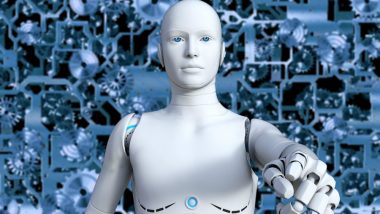New Delhi, Aug 12: The youth today are more likely to trust an artificial intelligence-run system than one controlled by humans, and they believe the "fractures" in society are manifestations of an underlying political problem, a World Economic Forum (WEF) report has claimed.
The report was launched as part of a drive to mark the International Youth Day, which is celebrated on August 12.
The WEF drive, called a 'Youth-Driven Recovery Plan', saw participation of over two million young people from across countries, including India, who shared their views on what will become the next normal for society, government, and business. Artificial Intelligence is Creating New Opportunities Which Could Not Be Achieved by Traditional Technology, Say Experts.
According to the survey, young people believe there is a serious crisis in politics, especially with regards to climate change policies, and income inequality.
"They believe that the fractures that have come to bear in society are manifestations of an underlying political problem. Concerns about corruption and stale political leadership have become urgent priorities for young people if they are to keep faith in the political system," the report said.
The survey found that young people would be more likely to trust a system run by artificial intelligence than humans. As part of the solution, they suggested greater investment in programmes that help young "progressive voices" join governments and become influential policy-makers, it said.
Still smarting from the effects of the 2008 financial crisis and faced with stagnating incomes, young people no longer seem to believe that they will enjoy a better standard of living than their parents did, the report found.
"They are extremely worried about their financial future. They want to see a global wealth tax on assets worth more than USD 50 million to safeguard social safety nets and avoid austerity measures that disproportionately burden youth and the working poor and almost half of the young people surveyed said they feel inadequately skilled and close to a quarter said they would risk falling into debt if faced with an unexpected medical expense," the report said.
The Davos Lab Survey showed that physical safety ranks as the greatest safety concern among young people, a potential function of the increased use of surveillance technology and militarised policing against activists and people of colour.
Climate change also ranked high among the concerns that are on most young people's mind.
"Young people want to see a halt on all new coal, oil and gas exploration and development to limit global warming to the 1.5°C limit set out in the Paris Agreement.
"They call on financial institutions to avoid bankrolling or underwriting companies that seek to start new fossil-fuel exploration and development, and on firms to actively replace corporate board directors who are unwilling to wind down fossil fuels or transition to green energy sources," the report said.
Another fact highlighted in the report was that though young people champion an open internet, they are concerned about its misuse.
"Half of the world's population still lacks access to the web and many contend with internet blackouts. A USD 2 trillion digital access plan is recommended to close the gap, especially in a socially distancing world that increasingly relies on virtual interactions," it said.
“The idea that we need to rebuild differently after COVID-19 is widely shared. We need a society, economy, and international community designed to care for all people, especially youth, who are the most important and most affected part of our global future.
"They are also the people who have the most innovative ideas and energy to shape a better world,” said Wadia Ait Hamza, head of the Global Shapers Community.













 Quickly
Quickly


